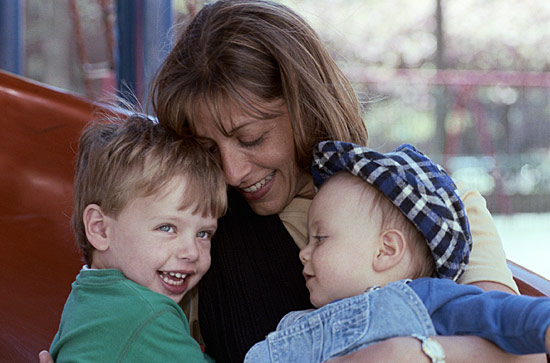Signs & Symptoms | Causes | Getting Help | Fact Sheets
 Does this sound familiar?
Does this sound familiar?
-
"Even though I was always tired, I kept waking up early in the morning. I completely lost my appetite. Everyone irritated me: people at work, my husband and my kids."
-
"For weeks, I was always on the verge of tears. I thought I had fallen into a black hole I couldn't get out of. Was I going to feel this way forever?"
-
"My family and friends noticed that I just wasn't myself anymore. I didn't enjoy the things I used to - playing golf, going out, even having sex. It became so difficult to concentrate at work that I felt worthless, like I couldn't do anything well."
Approximately one in four women can expect to experience depression in their lifetime. Regardless of age, race or income, depression can occur in any woman. Depression robs women of the pleasure found in daily life. Untreated, it can worsen existing illness and lead to feelings of giving up on life.
Signs & Symptoms of Depression
Women with depression do not all experience the same symptoms. The severity andfrequency of the symptoms as well as how long they will last, will vary from woman to woman. Some common symptoms of depression include:
- Persistent sad, anxious or "empty" feelings
- Feelings of hopelessness and/or pessimism
- Irritability, restlessness, anxiety
- Feelings of guilt, worthlessness and/or helplessness
- Loss of interest in activities or hobbies once pleasurable, including sex
- Fatigue and decreased energy
- Difficulty concentrating, remembering details and making decisions
- Insomnia, waking up during the night, or excessive sleeping
- Overeating, or appetite loss
- Thoughts of suicide, suicide attempts
- Persistent aches or pains, headaches, cramps or digestive problems that do not ease even with treatment
Take a Mental Health Screening now >>
Causes of Depression
In addition to gender, many things can contribute to depression. For some people, a number of factors seem to be involved, while for others a single factor can cause the illness. Things that may contribute to depression include:
-
Genetic and biological factors - For some people, depression seems to run in their families, making them vulnerable to depression as well. For those individuals, all the factors listed below are even more likely to cause depression.
-
Birth of a child - Between 10 and 20 percent of women develop a form of depression called post-partum depression, for up to a year following the birth of a child. Single moms, women with less supportive husbands and women with multiple children are at risk for post-partum depression.
-
Difficult life events - Histories of abuse and trauma, divorce, financial problems, moving, death of loved one and job loss - all can trigger depression. Experiences of harassment and discrimination also play a role. But sometimes even events that should be positive, like having a child, getting a job or getting married, can result in depression.
-
Daily life hassles and stress - It is not just the big events but the accumulation of lots of little stressors and hassles can also cause depression. For many depressed women, nothing big happened, but their lives are filled with the stress and the hassles that comes from always taking care of everyone else and never themselves.
-
Presence of other illnesses and medications - Hormonal disorders, cancer, diabetes, stroke, heart disease, Parkinson's disease and Alzheimer's disease can increase the likelihood of developing depression. Some medications can produce a depressed mood. Check with your health care provider regarding medications (prescriptions and over-the-counter) you may be taking and their possible interactions.
-
Other mental illness - such as anxiety and eating disorders, can make it more likely someone will fall into clinical depression.
-
Abuse of alcohol or drugs - Some people attempt to "self-medicate" to stop the emotional pain caused by depression by using alcohol and/or drugs but, unfortunately, this will worsen depression.
Regardless of the factors involved clinical depression is real. Chemical changes in your brain occur when you are depressed. Your brain and body simply stop working properly. It is not simply a sign of being weak, lazy or unmotivated. It is not simply "trying to get attention." It is a real disease, and it is serious.
Getting Help
Regardless of the factors involved, clinical depression needs to be diagnosed and treated. If you think you may be depressed, seek professional help. If you are depressed, a professional can work with you to develop a treatment plan. Here are some professionals that you can talk to: Types of Mental Health Professionals.
Other resources for getting help include:
- Your health plan or employee assistance program (EAP)
- Community mental health centers
- Social service agencies
- Private clinics
- Local Support Group
- Religious or Spiritual settings
Fact Sheets
Depressive Disorders
Depression and Women
Anxiety Disorders
Families and Loved Ones
Postpartum Disorders
Seasonal Affective Disorder (SAD)